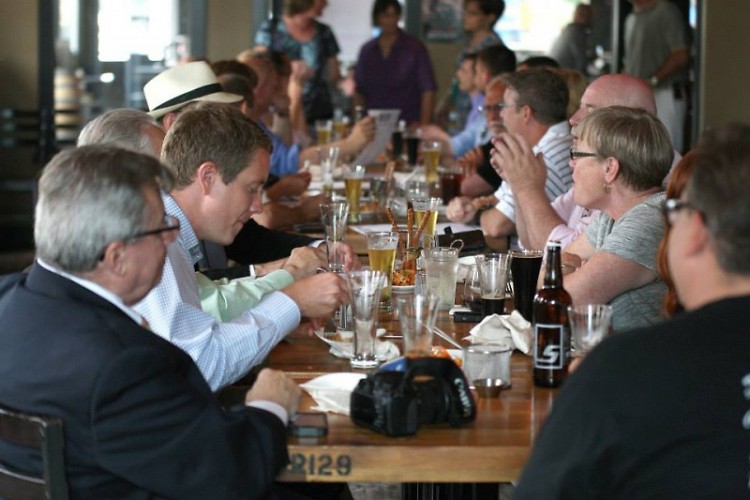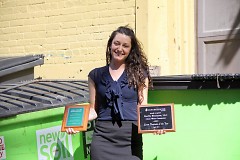“We rely on our environment to supply and support every single thing we do. Without a healthy environment, everything suffers,” says Autumn Sands, sustainability coordinator of BarFly Ventures and recent recipient of the Woman of Hope Award by the West Michigan Environmental Action Council (WMEAC).
Through composting and recycling, BarFly Ventures’ recent Irish on Ionia festival diverted almost 50 yards of waste, which is the size of half of a football field, from the landfill and incinerator.
BarFly includes HopCat, which has been named one of the Top 5 Great American Beer Bars for the past three years, McFadden’s Irish Pub, Stella’s Lounge and Grand Rapids Brewing Company (GRBC), the first USDA certified organic brewery in Michigan.
Sands began working for the company as a bartender for Grand Rapids Brewing Company. She noticed their use of compostable straws and started researching companies that manufactured and distributed compostable products. After bringing her research and ideas for improvement to the owner and GRBC managers, the bar began transitioning all of their disposables.
The company decided on World Centric, a business that provides zero waste solutions through selling compostable food service products. This transition led to a full analysis of their purchases across the board and their waste management to work toward sustainability.
Garry Boyd, managing partner of BarFly and board of director for the Michigan Brewers Guild, says the initial success with the transition and work toward lowering waste led to dramatic, cost-saving reductions.
BarFly furthered efforts in considering the environment when running all of its businesses by incorporating a “zero waste initiative,” that drives them to compost, recycle and reuse everything they can.
They compost all of their spent grain, about 5,000-7,000 pounds a week, Sands says, through a partnership with 20 Liters. The nonprofit organization works with local communities in Rwanda to implement solutions for a water filtration system. The water filters use natural materials like the grain to strain and clean the water. BarFly’s donation to 20 Liters has afforded 100 years worth of clean water to a family in Rwanda.
“Bringing on a full time sustainability czar, Autumn Sands, has helped solidify our program and expand the program as we enter new markets. Autumn is constantly challenging our practices to make sure we are walking the walk, since we are now talking the talk,” Boyd says.
BarFly is also a part of No Fracking Way, a collaborative effort of Michigan breweries and local organizations to raise awareness on hydraulic fracking and the threat it poses on clean water. Clean Water Action awarded BarFly Ventures with the award for Clean Water Innovator of 2014.
The breweries participating in No Fracking Way donate $1 per pint for each “clean water beer” sold at HopCat or GRBC. BarFly Ventures adds another $1 per pint sold. The funds have been donated to the Kent County Water Conservation, WMEAC and Respectmyplanet.org.
The company is supporting the cause because of the potential negative impact that fracking has on the ecosystem, human health and our fresh water supply. Since beer is made up of 95%-97% water, Sands says, this directly impacts their industry and many others.
“Michigan is seeing the highest amount of water withdrawals in the country for drilling operations, up to 35 million gallons per well have been permitted,” Sands says. “The water used in these operations is 100% consumptive, meaning it becomes so contaminated that it should never be returned back to the water cycle.”
BarFly Ventures is working with 10 nonprofit organizations and six Michigan breweries to promote open dialogue and raise awareness of the impacts of fracking.
Boyd says BarFly looks at the Triple Bottom Line: people, planet and profit.
“Improving morale, increasing emotional commitment and growing caring culture speaks to ‘people’,” Boyd says. “By teaching everyone why we are doing this and what kind of impact a small company like BarFly can have on the world, speaks to ‘planet’.”
When keeping planet and people in mind, he says, profit comes naturally because their systems cost less than just throwing away everything they produce as trash to a landfill.
Boyd says this culture is also crucial for a growing company like theirs that is moving into new markets, because leaders in cities where they’re expanding often ask them about the great programs they have first.
“It is imperative for business leaders to always consider the Triple Bottom Line when making decisions that will ultimately have an effect our environment, our shared resources, our health and the well being of our communities,” Sands says.
Currently, BarFly is working on strengthening their sustainability training and education process with their staff on their sites, as well as at home and in their communities.
They are partnering with My Green Michigan to create a new compost route in southeast Michigan, in order to increase accessibility to commercial compost services for businesses interested in moving towards zero waste.
BarFly has invested in an extensive energy audit for many of their sites in order to begin to identify waste and find more ways to increase efficiency with their energy and water consumption.
“I feel lucky to work with the team that BarFly has assembled. The answer is never ‘no’ but ‘how?’ and then we go figure that out,” Boyd says. “I am excited about the next steps toward sustainability and green initiatives we will be taking in 2015.”
The Rapidian, a program of the 501(c)3 nonprofit Community Media Center, relies on the community’s support to help cover the cost of training reporters and publishing content.
We need your help.
If each of our readers and content creators who values this community platform help support its creation and maintenance, The Rapidian can continue to educate and facilitate a conversation around issues for years to come.
Please support The Rapidian and make a contribution today.

